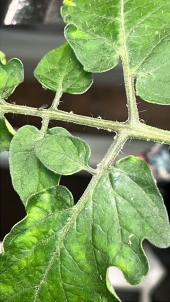
 4
4





 4
4




 7
7




In modern times the only right way forward is to come back to nature.
 6
6




See said, "Too much leaves and no fruit set can also be a problem created by over fertilization, wrong fertilization and over watering.
Invasive plants are Earth's way of insisting we notice her medicines. Stephen Herrod Buhner
Everyone learns what works by learning what doesn't work. Stephen Herrod Buhner
 4
4




 7
7




"The world is changed by your example, not your opinion." ~ Paulo Coelho
 4
4




 6
6




“We can complain because rose bushes have thorns, or rejoice because thorn bushes have roses.” — Abraham Lincoln
 5
5




G.W. Farnum wrote:
My neighbor gets better yields than me but his plants don't keep producing. They die shortly after he picks the first time. He claims that there is a fungus in the soil that limits the life of tomato plants in our area.
Weeds are just plants with enough surplus will to live to withstand normal levels of gardening!--Alexandra Petri
 6
6




 2
2




 2
2




“We can complain because rose bushes have thorns, or rejoice because thorn bushes have roses.” — Abraham Lincoln
 1
1




 2
2




Plants need nitrogen for above-ground growth. [...] Potassium is also essential for healthy root development, as well as helping plants protect themselves from disease. [...] Phosphorous is indispensable for the early and healthy development of plants, including root formation.
"We carry a new world here, in our hearts..." --Buenaventura Durruti
"Don't wish it were easier. Instead, wish you were better." --Jim Rohn
 4
4




G.W. Farnum wrote:I talked with a local gardener today. His take on my problem is two-fold. I'm planting too late in the spring and the temp is getting too high. He said that tomatoes don't fruit well above 90°.
He also said I need varieties resistant to nematodes, tomato yellow leaf curl, grey leaf spot, early blight and fusarium wilt.
He recommended Celebrity, Early Doll and Bella Rosa varieties.




"How fleeting are all human passions compared with the massive continuity of ducks.“ — Dorothy L. Sayers




"How fleeting are all human passions compared with the massive continuity of ducks.“ — Dorothy L. Sayers




"How fleeting are all human passions compared with the massive continuity of ducks.“ — Dorothy L. Sayers












“We can complain because rose bushes have thorns, or rejoice because thorn bushes have roses.” — Abraham Lincoln




Jen Fulkerson wrote:I wonder if it could be your water? It just seems like that's the common denominator???
 1
1




The best gardening course: https://gardenmastercourse.com
Permies.com FAQ
 8
8




 1
1




“We can complain because rose bushes have thorns, or rejoice because thorn bushes have roses.” — Abraham Lincoln




G.W. Farnum wrote:I talked with a local gardener today. His take on my problem is two-fold. I'm planting too late in the spring and the temp is getting too high. He said that tomatoes don't fruit well above 90°.
He also said I need varieties resistant to nematodes, tomato yellow leaf curl, grey leaf spot, early blight and fusarium wilt.
He recommended Celebrity, Early Doll and Bella Rosa varieties.

| I agree. Here's the link: http://stoves2.com |





